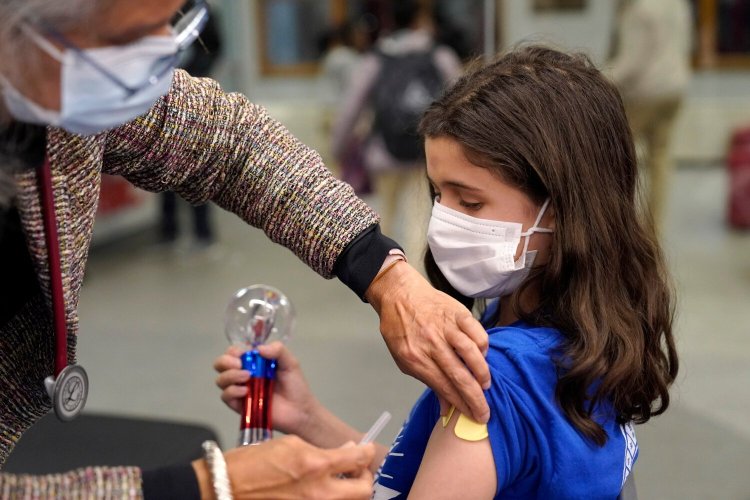Demand for coronavirus vaccines has spiked in the United States in recent weeks, as more Americans are eligible for booster shots and concerns grow over the omicron variant.
Health-care providers administered 2.18 million doses of coronavirus vaccines on Thursday, according to the Centers for Disease Control and Prevention – the “highest single-day total since May,” the White House said. According to the latest CDC report, over the week ending on Thursday, the average number of daily administered vaccine doses reported to the agency was 22 percent higher than the previous week.
Since omicron was first confirmed in southern Africa on Nov. 25, and soon after listed as a “variant of concern” by the World Health Organization, the Biden administration has been urging as many Americans as possible to get booster shots as the best means to protect themselves against it. All U.S. adults became eligible for boosters on November 19.
For most of October, fewer than or slightly over 1 million doses of coronavirus vaccines were reported to the CDC as being administered every day in the United States. By mid-November, those numbers hovered around 1.5 million on average. In the past three reporting days, they neared or exceeded 2 million.
Much is still unknown about omicron, against which some scientists and vaccine makers predict existing vaccines may not be as effective, but the new variant and “the idea that we have a virus that may evade two shots but that three shots are likely to be pretty protective, I think, has also gotten a lot of people much more focused on getting a booster,” says Ashish K. Jha, dean of the Brown University School of Public Health.
The increased demand for coronavirus vaccines is largely driven by demand for booster doses, CDC data shows. White House COVID-19 data director Cyrus Shahpar, calling out the booster numbers, cited the spread of omicron in a tweet, saying the country needs “to keep this up.”
The timeline for increased vaccine uptake precedes omicron and the adult booster expansion: Millions of children between the ages of 5 and 11 became eligible for a pediatric dose of the Pfizer-BioNTech vaccine on Nov. 2.
But omicron “may be the ‘boost’ to help the unvaccinated and the newly eligible to get motivated and vaccinated quickly,” said Scott Ratzan, a health communication expert at CUNY School of Public Health, in an email to The Washington Post.
Increased interest in vaccines can be attributed in part to clearer, concerted messaging around boosters coming from public health agencies, Jha said. There now exists “a broad consensus” among experts, he added, that boosters are needed, and “that’s helping a lot.”
While the uptake in booster doses is encouraging, “I am not seeing a ton of progress among (unvaccinated) adults who have been eligible for a long time,” Jha said. “A lot of people in America are relying on infection-induced immunity to get them through the rest of this pandemic, and I think omicron is going to test that in a way that nothing else has. I’m worried we’re going to see a lot of those people who’ve previously been infected and recovered get reinfected and potentially very sick.”
The first U.S. case of omicron was identified in California on Dec. 1, and cases have since been reported in at least 15 U.S. states, CDC Director Rochelle Walensky told ABC News Sunday. The delta variant, not omicron, accounts for the large majority of U.S. coronavirus cases at this stage, she said.
The CDC notes that its reported numbers are estimates that are subject to change and may contain duplicates, “over-estimates of first doses and under-estimates of subsequent doses.”
The White House has also urged Americans to get vaccinated ahead of the holiday season, when families usually gather indoors.
After the omicron variant was first identified in the United States, the CDC said its emergence highlighted the importance of vaccination and other public health measures. “Everyone 5 and older should get vaccinated and boosters are recommended for everyone 18 years and older,” the agency said in a statement.
Members of the White House coronavirus response team expressed confidence at a news briefing Friday that existing coronavirus vaccines would confer a measure of protection against the newly identified variant.
“Although we haven’t proven it yet, there’s every reason to believe that if you get vaccinated and boosted that you would have at least some degree of cross-protection, very likely against severe disease, even against the omicron variant,” National Institute of Allergy and Infectious Diseases Director Anthony Fauci said.
According to the CDC, more than 70 percent of the U.S. population has received at least one dose of a coronavirus vaccine, with near-universal coverage among those ages 65 and older. Nearly 60 percent of the population is fully vaccinated.
Still, on Thursday, President Biden said more than 100 million Americans who are eligible for booster doses haven’t gotten theirs yet.
Some pharmacies – which the White House said are distributing roughly two-thirds of coronavirus vaccines in the United States – have reported that they are struggling to meet the increased demand amid staff shortages in the health-care sector.
In one recent example, Walgreens failed to notify parents that their child’s vaccination appointment at a Cheverly, Maryland, location had been canceled because there were no pharmacists to administer the shots. Similar incidents have prompted the company to say it is working to better account for local cuts in pharmacy services.
Biden on Thursday urged pharmacies “to offer more appointments, more walk-in hours – including on weeknights and weekends,” and said that his administration would ramp up its booster program and make it easier for families to get vaccinated together.
Comments are not available on this story.
Send questions/comments to the editors.


